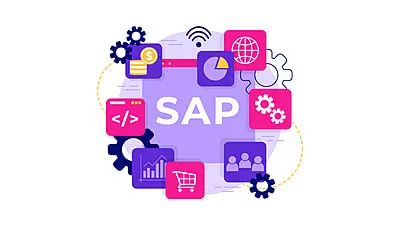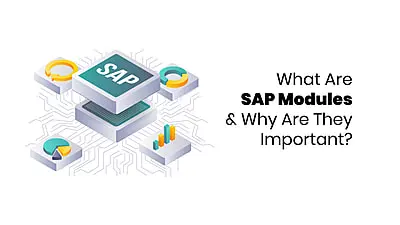SAP has many modules for different business needs. These modules help smooth business processes, improve decision-making, and boost efficiency. SAP modules are software tools that help businesses collect, store, manage, and understand data from different parts of the company. Each module focuses on a specific business function or process. These modules cover many areas, such as finance, logistics, human resources, and customer relationship management. Each is designed for a specific task and can be functional or technical.
Why Are SAP Modules Important?
Everything Works Together: SAP modules are made to link with each other. This means that information can be exchanged freely within a business’s various segments to check whether they are up to date with the rest of the company.
Saves Time: Many SAP modules facilitate work and make it significantly more efficient. Some tasks that would have taken quite a long time earlier can now be accomplished in a shorter time.
Accurate Information: This is because all the data is in one place, which reduces mistakes. This is helpful in that it assists the various firms or companies arrive at the right decisions through efficient data.
Grows with Your Business: Regardless of the company’s size, SAP can quickly grow according to client’s demands.
Stays Compliant: Most organizations must adhere to certain legal obligations. SAP assists them in complying by giving them tools to track and document numerous areas of their functioning.
These SAP modules are important. To know more about these modules, joining SAP S/4HANA course is the best option which gives you detailed knowledge regarding SAP.
Responsibilities of Key SAP Modules
1. SAP FI (Financial Accounting)
Purpose: Look over all the money matters of an organization.
Responsibilities: Including the general ledger, accounts receivable, accounts payable, asset, and bank. It ensures that all the figures that deal with finance are correct and current to be used in the report and the analysis process.
2. SAP CO (Controlling)
Purpose: Focuses on internal cost management.
Responsibilities: Cost center accounting, helps in planning, reporting, and monitoring business operations.
3. SAP SD (Sales and Distribution)
Purpose: Manages sales processes and distribution of goods and services.
Responsibilities: Sales order processing, pricing, picking, packing, shipping, and billing to ensure the efficient handling of customer orders and deliveries.

4. SAP MM (Materials Management)
Purpose: Handles procurement and inventory management.
Responsibilities: Purchase orders, goods receipt, inventory management, and material master data. It ensures that materials are available for production and sale.
5. SAP PP (Production Planning)
Purpose: Manages manufacturing processes.
Responsibilities: Production planning, scheduling, and control. It ensures that manufacturing processes are efficient and meet customer demands.
6. SAP HCM (Human Capital Management)
Purpose: Manages human resources functions.
Responsibilities: Employee data management, payroll, recruitment, training, and performance management. It helps in handling the entire employee lifecycle.
7. SAP QM (Quality Management)
Purpose: Ensures quality in processes and products.
Responsibilities: Quality planning, quality inspection, and quality control. It helps maintain high standards in products and processes.
8. SAP PM (Plant Maintenance)
Purpose: Manages maintenance of equipment and facilities.
Responsibilities: Maintenance planning, execution, and reporting. It ensures that equipment and facilities are in good working condition.
9. SAP WM (Warehouse Management)
Purpose: Manages warehouse operations.
Responsibilities: Inventory tracking, warehouse organization, and order fulfillment. It ensures efficient storage and retrieval of goods.
10. SAP CS (Customer Service)
Purpose: Manages service processes for customers.
Responsibilities: Service orders, service contracts, and customer interactions. It helps provide excellent post-sales support.
How to Specialise in SAP Modules
If you’re excited to specialise in SAP modules, you have two primary options: online or offline training.
- Online Training: Depending on the student’s timetable and choice, online classes allow the student to study in a convenient place. They are ideal for people with many engagements or for those who don’t like face-to-face consulting.
- Offline Training: Conducting training in class offers interaction with the trainer and other trainees in person. It’s advised for those who appreciate the face-to-face learning environment and constant communication with the professor.
Both are credible and useful in providing information and intelligence and teaching essential skills. Let’s pick which one is advantageous according to learning strategies.
No matter what training approach you decide to use, real guidance on SAP functionality will be essential for your efforts. Thus, it’s vital to have practical assistance. Look for SAP courses online that offer:
- Hands-On Labs: Virtual laboratories where you can work on SAP software to consolidate your knowledge.
- Real-World Scenarios: These interdependent modules will enable you to learn how the various SAP modules are applied in real business contexts, such as offers to order courses with cases or business simulations.
- Mentorship and Support: Having trainers or tutors who you could consult besides training at the place where the program is undertaken.
Knowledge of SAP modules is fundamental to the effective implementation of SAP systems’ benefits. Whether exploring SAP S/4HANA FI or other modules, identifying their relevance and relevance allows for better decisions concerning training and implementation. Stay tuned for more insights and tips on SAP and other business solutions from Finprov, a well-known SAP training institute based in Bangalore.










